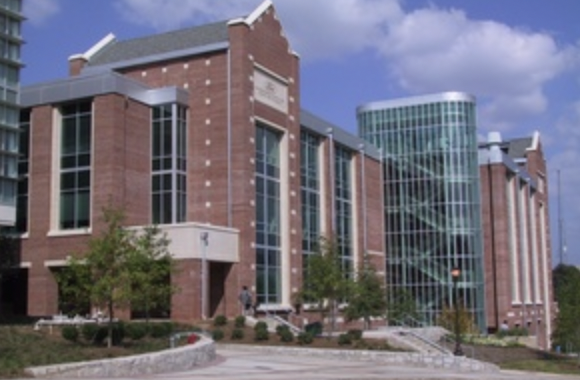In a fiscal year indelibly marked by the pandemic, College of Sciences researchers and students maintained high research standards despite the obstacles and restrictions of Covid-19. The result was a high rate of research study submissions during FY21 (July 1, 2020 to June 30, 2021) at Georgia Tech — with some significant funding wins for the College of Sciences.
“Students used their creativity to imagine new experiments, data analyses, and modeling studies that were feasible despite our facilities being shut down fully last spring and partially throughout summer, fall, winter, and spring of 2021,” says Julia Kubanek, vice president for Interdisciplinary Research (VPIR) at Georgia Tech. “Because of the safety and effectiveness of Covid-19 vaccines, we are now in a position to return more fully to lab- and field-based research. It’s energizing to once again learn from each other in collaborative research settings and to meet in person to discuss results and plan new projects.”
Kubanek, a professor in the School of Biological Sciences and the School of Chemistry and Biochemistry, who served as associate dean of Research for the College of Sciences until assuming her new role as VPIR on July 1, 2021, says Georgia Tech faculty have been “heroic” in juggling remote and hybrid teaching, and remote student mentorship, while protecting health and safety in their labs. “Each faculty-led team of trainees and researchers has had to decide what works for their own projects, deferring some collaborative field and lab experiments that were unsafe during the year because we couldn’t work shoulder-to-shoulder,” she says. Faculty remained in close contact with sponsors like the National Science Foundation and National Institutes of Health, which made accommodations for project timelines and experimental design.
Faculty and students were also involved in quick pivots of their research so they could study the pandemic. Research teams launched entirely new initiatives focusing on pandemic response, vaccine development, antiviral drug discovery, Covid-19-related testing, and modeling of disease transmission.
“Students and postdoctoral researchers in the College of Sciences got to play critical roles in these projects, which brought new meaning to us regarding Georgia Tech’s mission to improve the human condition,” Kubanek says.
Here are some major research funding grants approved for the schools during FY21 in the College of Sciences, along with coordinating principal investigators and funding sources:
Modeling SARS-CoV-2, Interventions, and Impacts on Healthcare Resources (U.S. Department of Health and Human Services)
Joshua Weitz, Patton Distinguished Chair in the School of Biological Sciences and co-director of the Interdisciplinary Ph.D. in Quantitative Biosciences, is a key researcher in Georgia Tech’s response to the novel coronavirus. Weitz co-led development of a modeling tool early in the pandemic for estimating risk to those attending events of various sizes in all U.S. counties.
Exploring a Reservoir Within a Greenland Glacier, and Plumbing the Uncertainties of Sea Level Rise (Heising-Simons Foundation)
Winnie Chu, an assistant professor in the School of Earth and Atmospheric Sciences, is studying the Helheim Glacier, which could lead to more clues about climate change’s impact on losses to Greenland’s ice mass.
Neha Garg Receives NSF CAREER Award to Fight Coral Reef Disease (NSF)
Garg, an assistant professor in the School of Chemistry and Biochemistry, has won an NSF CAREER award to study Stony Coral Tissue Loss Disease, which has already infected more than 20 species of corals off Florida’s coast.
Topology Between Dimensions Three and Four (NSF)
Led by Jennifer Hom, associate professor in the School of Mathematics
Program of Research on Multimodal Human-Machine Interfaces (Toyota Corp)
Led by Bruce Walker, professor in the School of Psychology and School of Interactive Computing
The Challenge of Predicting Rainfall in a Changing Climate (NSF)
Jie He, assistant professor in the School of Earth and Atmospheric Sciences, has received an NSF CAREER award to unlock the uncertainty in rainfall predictions.
Giant Polymer Brushes: How Fluid-Like Hyaluronan Brushes Minimize Biofilms Adhesion (NSF)
Led by Jennifer Curtis, associate professor in the School of Physics
Characterization and Recovery of Critical Metals from Municipal Solid Waste (U.S. Department of Energy)
Led by Yuanzhi Tang, associate professor in the School of Earth and Atmospheric Sciences
GLACIOME: Developing a Comprehensive Model of the Coupled Glacier-Ocean-Melange System (NSF)
Led by Alex Robel, assistant professor in the School of Earth and Atmospheric Sciences; learn more about Robel's recent research here.
Reposition and Optimization of Deferiprone for Breast Center Therapy (NSF)
Led by Adegboyega "Yomi" Oyelere, associate professor in the School of Chemistry and Biochemistry, and Yuhong Fan, associate professor in the School of Biological Sciences and Georgia Research Alliance Distinguished Scholar
Breaking the Chain: Disrupting Guinea Worm Disease Transmission (The Carter Center)
Led by Jeannette Yen, professor in the School of Biological Sciences
For More Information Contact
Renay San Miguel
Communications Officer II/Science Writer
College of Sciences
404-894-5209



